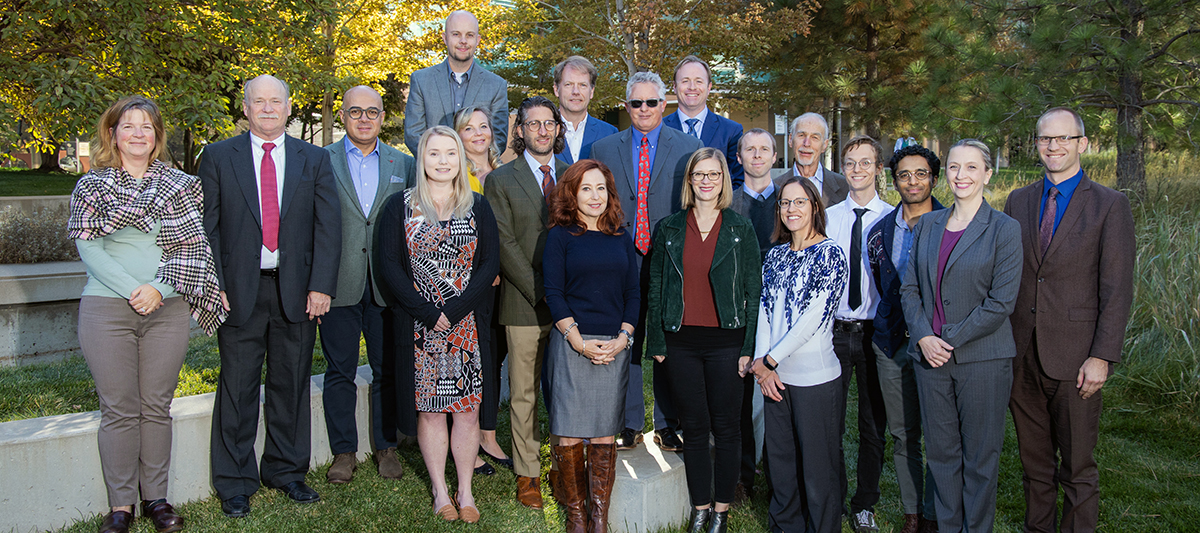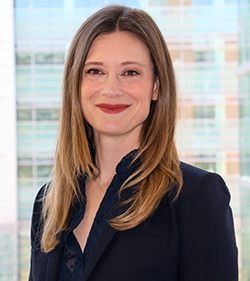
Neurosurgery Research Mission
The Research Program is a vital component of the mission of the Department of Neurosurgery. Our research efforts incorporate cutting-edge neuroscience and bioengineering approaches and robust clinical research environments that draw from the vibrant research community of CU Anschutz.
Our program is composed of over 20 labs with research topics that range from tumor, stroke, deep brain stimulation, microsurgery, cellular mechanisms of epilepsy, cannabis, mechanisms of neuromodulation devices, pediatrics, brain injury, aneurysm and regenerative medicine. Faculty engaged in research are word-leaders in their field, focused on designing patient-centered innovations.
Vice Chair, Research

Cristin Welle, PhD, Professor
BIOElectrics Lab
[email protected]
303-724-9116
BIOElectrics Lab
Featured Neurosurgery Grants
Multiple Sclerosis
Principal Investigators, Cristin Welle, PhD and Ethan G. Hughes, PhD, were awarded an NIH RO1 grant.
The neural mechanisms underlying motor and cognitive impairments in multiple sclerosis (MS) patients are largely unknown. This project uses novel synthesis of approaches in oligodendrocyte biology and neurophysiology, to evaluate how myelin loss affects neuronal circuit function and elucidate the effectiveness of remyelination therapies on restoring neural function and behavior.
Schizophrenia
Principal Investigator, Judith Gault, PhD, was awarded an NIH RO1 grant.
The main goal of the project is to address ethical concerns raised from both current and historically controversial psychosurgeries that are driving disparities in accessibility to emerging BRAIN Initiative advanced neurotechnology that require a neurosurgical intervention. We will be characterizing capacity to consent, surgical risk, and disease-related burden on quality of life in subjects with treatment-refractory Parkinson’s disease undergoing DBS to guide enrollment of treatment-refractory schizophrenia for a DBS clinical trial planned in the future. The Neurosurgery team on this grant includes Steven Ojemann, MD, John A. Thompson, PhD, Brian Hoyt, PhD, Pamela David-Gerecht, PhD and Patrick Hosokawa.
Brain Tumor Extracellular Vesicles
Principal Investigators Michael Graner, Ph.D., and Xiaoli Yu, Ph.D. were awarded an NIH R33 grant.
Cells of the Central Nervous System (CNS) shed extracellular vesicles (EVs) into their external environment, especially during pathologic states. Such EVs are considered high-value biomarker reservoirs due to their cell-of-origin specific protein/nucleic acid/metabolite content. We are developing phage peptide technologies for enrichment, isolation, and characterization of EVs of CNS origin from biofluids of patients with CNS diseases. The unbiased nature of phage display and its ability to detect non-protein moieties make phage a unique and powerful technique to differentially probe EV surfaces. The project has strong potential to generate valuable peptides for biomarkers for patients with brain tumors and other CNS disease, as well as reagents for therapeutics
Sleep Dysfunction in Parkinson's Disease
Principal Investigator John Thompson, Ph.D. was awarded an NIH UH3 grant.
This project is a multi-PI (Drs. Aviva Abosch (Contact PI), Clete Kushida, Casey Halpern and John Thompson) multi-institutional effort composed of two clinical sites (University of Nebraska Medical Center and Stanford) and two computational sites (CU Anschutz and York University) focused on exploring the use of adaptive neuromodulation of the subthalamic nucleus in patients with Parkinson's disease (PD) to treat sleep dysfunction. PD patients experience both motor and non-motor symptoms. Non-motor symptoms are disabling for patients, precede the onset of motor symptoms by a decade, and are less effectively treated. Advanced PD is routinely treated with subthalamic nucleus (STN) deep brain stimulation (DBS) surgery. Several recent studies have reported that STN-DBS also provides benefits for sleep dysregulation through normalization of sleep architecture. Additionally, local field potentials recorded from STN DBS electrodes implanted for the treatment of PD have led to the identification of unique spectral patterns in STN oscillatory activity that correlate with distinct sleep cycles, offering insight into sleep dysregulation. This proposal will leverage novel investigational DBS battery technology (RC+S Summit System; Medtronic) that allows the exploration of sleep biomarkers and prototyping of closed-loop stimulation algorithms, to test the hypothesis that STN—a highly interconnected node within the basal ganglia—contributes to the regulation and disruption of human sleep behavior and can be manipulated for therapeutic advantage. Specifically, in PD patients undergoing STN-DBS, we will determine whether STN oscillations correlate with sleep stage transitions, then construct and evaluate sensing and adaptive stimulation paradigms that allow ongoing sleep-stage identification and induce through adaptive stimulation an increase in the duration of sleep stages associated with restorative sleep.
Neural Mechanisms of Working Memory
Principal Investigator John Thompson, Ph.D and Steven Ojemann, M.D. were awarded an NIH U01 grant.
This project extends and expands a multi-institutional, integrated, multi-disciplinary team (Johns Hopkins, U Toronto, Children's/Harvard, CU Anschutz, UCSB) led by Drs. Ueli Rutishauser and Adam Mamelak at Cedars-Sinai/Caltech focused on studying the rapid formation of new memories and the recall of old memories to inform decisions that are essential for human cognition. The long-term goal of this research is a circuit-level understanding of human memory to enable the development of new treatments for the devastating effects of memory disorders. Our experiments utilize the rare opportunity to record in-vivo from human single neurons simultaneously in multiple brain areas in patients undergoing treatment for drug-resistant epilepsy, integrated, and multi-disciplinary team. Jointly, we have the expertise and patient volume to test key predictions on the neural substrate of human memory. We will utilize a combination of (i) in-vivo recordings in awake behaving humans assessing memory strength through confidence ratings, (ii) focal electrical stimulation to test causality, and (iii) computational analysis and modeling. The expected outcomes of this work are an unprecedented characterization of how episodic memories are formed, retrieved, and used for decisions, and how temporally extended experiences are segmented to form distinct but linked episodes.
DOWN SYNDROME BIOBANK CONSORTIUM, DSBC
Principal Investigator: Ann-Charlotte (“Lotta”) Granholm.
The DSBC is a consortium focused on collecting and disseminating brain tissue and associated fluids for research on the brain throughout the lifespan of individuals with Down syndrome. The consortium has 11 active sites with 7 different sites in the USA, 3 in Europe, and one in Calcutta, India. Dr. Granholm received a 5-year grant from the BrigthFocus Foundation Bold Initiatives and recently a grant from Lejeune Foundation to support the activities of the consortium. Individuals with Down syndrome have increased their lifespan significantly in the last 4 decades and now often live into their 60s. With this increased lifespan comes an increased incidence of early onset Alzheimer’s disease and other age-related conditions, most likely due to several over-expressed genes on Chromosome 21. The activities of this consortium have led to increased grant funding to the consortium members and multiple manuscripts in high-end journals.